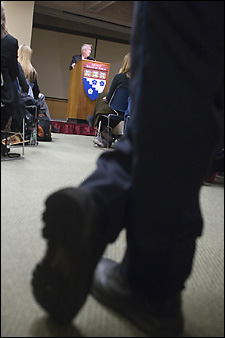‘Teacher Man’ talks about ‘writer man’
At the Gutman Center, author, raconteur, former teacher Frank McCourt charms his audience
Frank McCourt, the schoolteacher-turned-memoirist, appeared at the Gutman Conference Center Tuesday evening (Dec. 12) to share the tale of how his New York City students goaded him into turning his “miserable childhood” in Ireland into the stuff of best sellers.
The event was part of the Harvard Graduate School of Education’s (HGSE) Askwith Education Forum, an appropriate venue for the speaker to voice a few choice words about the state of the teaching profession and the politics of education in this country.
Kathleen McCartney, HGSE dean, introduced McCourt, commending him not only for his great skill as a storyteller but also for his “ability to inhabit the mind of a child.”
Education in Ireland when McCourt was growing up was characterized by “brutality,” he said. It was a “victim-type education” focused on the story of how Ireland had been invaded by the Anglo-Normans. But there were a few bright spots – music (“hymns in English, Irish, and Latin”) and poetry (Tennyson and Shakespeare). “How could you hate the English if they produced people like this?”
The brightest part of his childhood was the adventures he had as a boy on the streets of Limerick. “We told our own stories, we played our own games.” As the afternoon would fade to evening, there would follow what McCourt called a “symphony” of mothers’ voices all over Limerick, calling their children home to a supper of tea and bread. “A balanced diet,” he added. “What more can you ask for?”

Amid such poverty, anyone who got a chance to go to the movies – or anywhere – was honor-bound to share the experience with others – frame by frame. This helped develop storytelling skills, McCourt said.
But the episode that he later recognized as the first real challenge to him as a narrator came later, when, as an American soldier posted in Germany, he flew to Northern Ireland to visit his father’s family.
His grandmother wanted to know, “Francis, what is it like to be on an airplane?”
His first reaction was to wonder, “What kind of question is that?” he said.
“But I realized that she’d never done that and really wanted to know, ‘What is it like to ride in an airplane?’ That’s the task of the writer, to describe what something is like.”
After his Army experience, he returned to New York and worked on the waterfront.
Then came the experience when he literally walked into a university education, despite having ended his schooling in Ireland at 13: After sitting in a bar in Greenwich Village and contemplating his own future as a dockworker, McCourt walked out of the place, across Bleecker Street, and into the admissions office at New York University. “Something was leading me, something spiritual,” he said.
He filled out an application on the spot, and just as it was being noticed that he had left blank the line where he should have entered the date of his high school graduation, the director of admissions happened by.
No, he hadn’t gone to high school, he explained, but he had read books. What books? “Dickens.” That cut no ice; everyone reads Dickens. “Dostoevsky – ‘The Brothers Karamazov.’” That got a little more respect. Then finally: “I’ve read James Joyce’s ‘Ulysses.’” That clinched it. He was admitted, on probation, for a year, as long as he kept up a B average.
He made it through, winning a diploma and a teacher’s license – and ended up teaching at McKee Vocational High School on Staten Island.
On his first day, he met Joey Santos, whom he came to think of as “the mouth” of the class: “Teacher man, did you go out with girls in Ireland? Did you go swimming in Ireland? Did you have water?” So, he told his students about his Irish childhood in response to these questions – questions motivated by the desire to avoid whatever that day’s lesson plan called for, perhaps, but also by genuine curiosity.
It was exchanges like this that led him eventually – after he retired from teaching – to realize that his impoverished upbringing was really his greatest treasure as a storyteller. As his students told him: “You’re lucky you had a miserable childhood.”
“Teacher Man,” published in September, is the third installment from this treasure, following the Pulitzer Prize-winning “Angela’s Ashes” and “‘Tis.”
When the floor at Gutman was opened to questions and McCourt was asked what can be done about the “ineffectiveness of public school teaching,” he had a ready answer: “Reduce class size and increase teachers’ salaries.”
He also said that something had to be done to increase the social status of teachers – so that mothers coo about “my son the teacher” the same way they go on about “my son the investment banker.” Teachers need to become like the movie-star heroes of the “New Ireland,” Liam Neeson, Pierce Brosnan, and Colin Farrell. “Teachers need to become sexy.”




